- Home
- Dusty Richards
Massacre at Whip Station Page 21
Massacre at Whip Station Read online
Page 21
“Do your mother and Gert—do they ever laugh? Have fun?”
“On Christmas and birthdays,” he said. “And Gert laughs with her Injuns.”
“Is that all?”
“Sometimes after dinner,” Slash said. “Grandpa acts out some funny stories when he’s got some whiskey in him. Now let me ask you something.”
“Certainly.”
“If you don’t mind me saying so, this sounds like more than ‘just wondering.’”
“Does it?”
“You sound like Pa when he’s talking to Horsehead Billy about buying an animal,” Slash said. “Are you—would you—ever think of settling here?”
If it weren’t night he would have seen her blush. She thought she heard more than a question in his tone. He sounded almost eager.
“Is there a church anywhere between Vallicita and Oak Grove?” she asked.
“Mexicans got a place west a bit, outside San Felipe.”
“Where do you worship?” she asked. “Marry?”
“There’s a traveling padre, sets up a tent every other Sunday about a mile east of Civil Gulch. On Christmas, we go to the Mission San Luis Rey outside San Diego. It’s very holy there. We feel kinda sacred just showing up.”
Clarity was about to speak when Slash held up a gloved hand beside the brim of his hat.
“Hush!” he whispered.
As she had done before when Joe had roughly urged silence, Clarity obliged. Despite her confidence with a gun, this was not her land. She did not know the rules or the possible fox traps. This was not civilization, like back in Murray, Kentucky.
Slash reined his horse to a stop, rose in the saddle. The animal was restless again. His rider half-turned and listened.
“Clarity, get back to the stagecoach,” he said, settling back down and riding ahead. “We got company! Lots of it!”
CHAPTER 19
General Guilford lay in bed beside his wife, unable to sleep and unwilling to get up.
His mind was always engaged, relentlessly, whenever a battle was imminent. It could be days away but he was already considering the many things that could go wrong. It was said that generals had it easiest. They were not facing bullets and bayonets. But the soldier had only two concerns: advance and survive. The general had hundreds, often thousands of concerns. To see that each man was as prepared as possible to achieve those goals. And to see that the honor of the nation he was sworn to protect was unblemished.
General Guilford carried the tradition of George Washington and Andrew Jackson in his heart—and on his back. Their heroism and resolve gave him something to reach for, but it reminded him that war was imperfect and unpredictable. How many times did General Washington retreat before achieving final victory? How did it weigh on General Jackson that his greatest battle, in New Orleans, with its fire and death, occurred after the 1812 war had already ended?
A wounded soldier had only to heal or learn to live a different way. The general had to look into the lost and sorrowful eyes of every soldier who lost a limb or his sight or his brother or best friend.
A war was how a general tested not just his tactical skills but his conviction that this war, any war, was necessary.
That was what General Guilford was doing now. The maps were already drawn. The arms were already stockpiled. He had to make very sure that what he was doing was for country first and vanity second.
What does a place in history matter if it is beside the dishonored busts of Benedict Arnold, Generalissimo Santa Anna, or the benighted John Wilkes Booth? he wondered.
As his mind drifted from plans to risks to potential outcomes, Guilford was startled by a soft, respectful knock on the door. The officer was awake and staring at the torchlight playing on the roof of his quarters. The knock had already roused his wife, who turned her pale cheek toward him. He kissed it lightly.
“Rhodes?” his wife said groggily.
“I’m waiting for a report,” he said as he flung off the light quilt. “This may be it.”
“Don’t be long,” she urged sleepily.
“Shan’t be more than a few minutes,” he said hopefully.
Audrey Guilford cooed and let her head roll back into the deep pillow.
His poor wife. She tried so hard to look after him. After twenty-nine years, he would have thought the onetime nurse would know better. Perhaps she did. She also knew the demands and dangers faced by cavalry troops and officers alike. Maybe this was just a way to remind him that she cared. Whatever the reason, he always appreciated the effort.
Guilford grabbed a robe from a rack in the corner, was still tying the belt as he turned the knob on the three-panel timber door. Guilford was hopeful, even eager, but also concerned. According to the grandfather clock thunking in the corner, it was not yet three a.m. It was too early by several hours for the stagecoach to have reached Oak Grove where—he assumed—the next attempt would be made to secure the shaman. He had already considered that Kennedy and Hathaway would have tried an alternate plan, to take the coach between station stops. He did not know if the two men had that kind of courage, to ride at night. He had tried to calculate whether there would even have been enough time for the men to return to the mine from the failed effort at Civil Gulch, regroup, and catch the stage en route.
His gut burned to know.
The door opened and Lieutenant Anthony was standing there, chest out, breathing heavily but trying not to show it. He would have had just moments to wake, dress—on the run—and escort the two men standing behind him to the general’s quarters. There were two other men behind him in the musty, narrow corridor. One was the oak-solid Sergeant Russell, a trusted veteran of several of Guilford’s campaigns. The mustachioed man was holding the lantern to one side so that the forward side did not blind the officer. The solid orange glow lit the faces of the two other men along with the walls, covered with small paintings of bucolic scenes painted by Audrey.
The other man was a different courier than the one who came before. He stood a respectful distance behind the lieutenant.
The general stepped into the hallway and shut the door behind him, so as not to disturb Audrey. The other three men shuffled back awkwardly even as Lieutenant Anthony was in mid-salute.
“Sir,” the lieutenant said, recovering, “Private Morgan from Major Howard’s column in the field.”
Guilford’s gaze shifted to the man. Unlike the previous messenger, this man was covered with fine prairie dust. He had not come along the scrub-and-rock fields between Temecula Point and the fort.
“Come,” the general said to the boy.
Lieutenant Anthony stepped aside and the youth stepped forward. He saluted.
“Sir, Private Morgan bringing the respects of Major Howard and his oral report,” he said.
Guilford frowned. “The major did not have time to follow protocol?” he asked sternly.
“General, sir, my apologies. The major shared nothing but the dispatch I bring.”
“Of course,” Guilford said.
He blamed no one, but security was ever on his mind regarding this matter. The fewer people who knew about this operation, the better he would sleep—when he slept.
The general looked at the other two men. “Sergeant—you may go. Set the lantern on the table.”
“Yes, sir!”
“Lieutenant Anthony? Wait for me. There may be orders.”
Both men saluted, did a smart about-face, and departed quickly.
The general regarded the boy. The courier looked anxious, having already disappointed the renowned general. Guilford forced himself to smile a little, benignly. His dark eyes twinkled in the light of the lantern.
The youth relaxed.
“Your message, son?” the general asked.
“Sir: While on night patrol, Major Howard encountered Messrs. Kennedy and Hathaway approximately eight miles northeast of his camp. The civilians reported two attacks. The first was by a civilian, Joseph O’Malley, and a threat to the Butterfield stagecoa
ch. The second was an attack by at least three savages, their tribes being unknown. They fled at the approach of the column, which rode north to try and overtake the coach.”
The boy had been looking past the general, reciting the message by heart. It was an incomplete confusion that told him very little. Major Howard was not privy to Major Guilford’s plan, nor to the mission of Kennedy and Hathaway. The general did not know whether this information helped or hurt the advancement of the operation.
The young man had no doubt recited every word he had been told. Hopefully, the private saw more.
“Did Kennedy and Hathaway accompany the major?” Guilford asked.
“Yes, General, they did.”
“Who were the dead men?”
“I only know that they were Confederates, sir,” the courier reported.
“How was the other victim lying?”
“On his back, sir.”
“His head facing which way?”
The courier thought for a moment. “North.”
That likely meant the Indians had come up from the South. Apaches were the only ones who routinely rode at night.
They were not in pursuit of the column, or they would not have arrived before, Guilford thought. Were they out for mischief or were they after the stage, perhaps the shaman?
Guilford hadn’t realized he had been holding his breath until he exhaled.
“Was there any other information about the stagecoach or O’Malley?” Guilford asked. “Speak freely. What else did you see or hear? Anything at all.”
Private Morgan thought hard. “We put the dead under piles of rocks, sir. I heard mention, General, that this Kennedy and Hathaway were Indian agents.”
“Anything else?”
“A name,” the young man recalled. “Someone said a name—Peterson. I don’t know who he is, sir. I think it was Major Howard who said it. I wasn’t facing him.”
“Could he have said it to the Indian agents?”
The young man thought harder. Guilford could see it in his young face, an eagerness not to disappoint, to prove himself, to remember without embellishment. If it was possible to be proud and frustrated in the same moment, the general was both.
“I can’t exactly say, sir. They were back there with the major but I didn’t hear a response.”
The general nodded. “You’ve done very well and I thank you,” he said. “Go to the mess and remain here.”
“With respect, sir, I was instructed by the major—”
Guilford stopped him with a look. “As you say, Private, he is a major.”
“Yes, sir!”
The young man saluted again, turned sharply, and left.
It was not just the health of the private that concerned Guilford. He was young, and young soldiers were regularly ordered to push themselves. What concerned him was the fact that Indians were abroad. Guilford did not want a lone cavalry rider with highly secretive information riding through the plains at night. Such men were known to put the barrel of a gun in their own mouth rather than be captured by Apache.
The general took a few steps down the corridor, walking lightly so the floorboards didn’t creak. His eyes fell on a miniature Audrey had painted of her husband many years ago when he was still a colonel. She had hung it next to the arbor scene she had painted from memory. The spot on the Hudson River where he had proposed.
“Lieutenant!” Guilford said in a loud whisper.
The man emerged from the small secretary’s office where he had been waiting. “Sir?”
“Please have Colonel Burke in my office in fifteen minutes. I’ll dress there—field uniform.”
“Yes, sir.”
Anthony picked up the lamp and General Guilford followed the tall young Pennsylvanian down the corridor to his office headquarters. The lieutenant set the one lamp on the desk and was set about lighting the other desk lamp. Lieutenant Anthony then went to the wardrobe where he efficiently removed the general’s uniform from between a frock coat and surtout coat. He hung it on a brass hook inside the door. Typically, he would stay to brush cigar ash and dirt from the fabric. But an order took precedent over protocol. He left at once through the courtyard door to rouse the colonel.
The glass bowls of the lamp cast a warm, welcoming light through the stuffy room. The windows would remain closed to keep from attracting moths. It wasn’t only the inconvenience of the pests but the indignity of a general trying to give orders while constantly being distracted and swatting.
Guilford went to a washstand in a small alcove and scrubbed his eyes. Then he walked over to the wardrobe. He eyed the brass buttons as they gleamed in the light, touched the stars on the epaulets. He was about to set matters in motion—matters that depended on the loyalty of his officers and men to him, personally. Matters that would not have the benefit of events having unfolded according to plan.
“But this is too big, too important to stop,” he reminded himself softly.
As if he needed a reminder. There had been little else on his mind for months. It was more a matter of reminding himself that it was unfortunate things had not gone according to plan. Guilford had wanted to minimize civilian casualties. It was equally unfortunate, but not wholly unexpected, that it should be so. Kennedy and Hathaway had the credentials to gain access, but they did not possess the experience to pull off the maneuvers that had been necessary. He always suspected that the Fort Sumter moment, the flashpoint that would start the War, would fall on him.
Now it had.
Moving his burly arms and shoulders like a bear, Guilford shucked his robe and hung it in the wardrobe. As he slipped from his pajamas, he wondered if the two Indian agents ever had any idea what the true goal of their activities had been. They did not seem to possess the vision or imagination. And Peterson would not have said anything to them.
That doctor, though a Southerner, was an angel of God Himself. He had toiled for the Union, had saved the life of his precious Audrey and others at the fort when their own doctor was seconded by the Union once again. Peterson had been headed west to seek a new life and stayed. They shared war stories, Guilford of the Confederates who came out here during the war trying to recruit Indians, Peterson of the Northerners who forced him into servitude.
“If saving lives can be called such,” Guilford had mused.
“When they heal and attack your neighbors—it can,” Peterson had answered. He had not said it with bitterness but with sadness.
Well, war is sadness as much as it is glory, Guilford thought then, and now.
It was Guilford who, one night, suggested a way they could both help fix the blight that continued to afflict the North, the South, and the West—even though all were supposedly at peace.
“I am for anything that preserves life, anywhere,” Peterson said.
“Does that mean Indian life?” Guilford had asked.
It had taken a long moment before the doctor answered. “If they would allow us to live, I would wish the same for them.”
“But they do not,” Guilford had said.
That truth had saddened Peterson. Expansion and growth were not always equitable masters, especially where young nations were concerned. That did not need to be explained to Peterson.
“Sometimes legs must be sawed off to save a life,” the doctor had responded.
Guilford had gone on, then, to talk about how the North and South would always be at war. Their ideologies were nowhere near the same and defeat would only arrest the Confederacy, not kill it. The South was less a place than an idea that would never die, a way of life that could not die.
“The muscle of the North, its desire to build and transform, to control and rule, could also not be stopped,” the general had said. Then added, “Except by one thing.”
He went on to explain some of what Peterson already knew, that the Confederacy had lost the War because while it had the will, it had neither the industry nor manpower to resist the Northern war machine. There was nothing for the North to struggle through
except Rebel soldiers. Landscape, towns, even proud cities were no match for Union numbers and torches.
Guilford had learned from that war. For four years he had fought with that colossus as it strode through the South. He had studied dispatches and red-taped files of maps and newspaper reports. They were unanimous in pointing him to one obstacle the Union Army could not have beaten.
“The mountains and canyons, rivers and deserts that separate East from West are similar to terrain that has challenged the finest generals from Hannibal to Napoleon,” he said. “The ocean that separates the West is formidable as the waters that thwarted the great Spanish armada. We, here, are safe from any attack save through narrow corridors of foreign lands.”
Peterson had regarded him with dawning realization.
“That’s right,” Guilford had said. “The geography I just described will make the Western States of America impregnable.”
Guilford had outlined his plan to a riveted Peterson over a bottle of whiskey at this desk beside him. He saw, in the doctor’s expression, a way to salvage the honor of his lost South without having to recruit the old, depleted stalwarts.
The general told him about a planned meeting between the President of the United States and the revered Serrano shaman Tuchahu.
“If anything were to happen to so revered a figure, the Indian population would go mad,” Guilford had said.
A medicine man was not like a war chief who was expected to die in battle, who wished it. A medicine man was sacred. Moreover, Tuchahu was the son of Hanakwiche, a shaman whose place he had taken. The death of the aged Hanakwiche was mourned throughout the Indian population.
“The murder of such a man would enflame the entire savage nation,” Peterson had remarked thoughtfully.
The plan had been broadly laid out before sunrise though it was not yet ready to be executed. Meetings first had to be arranged with the commanders of the other forts out west. Most of them proved eager to join the general. To a one, they felt forgotten out here. They had fought a brutal war against the Confederacy. Now, there was no place an army was of any use except against the Indian. And to Washington, the Indians were far, far away. Even that very real war was one that Washington was loathe to fight. Popular opinion in the big cities was against it. Without the cause of slavery to embrace, the people of the northeast were without a banner to raise.

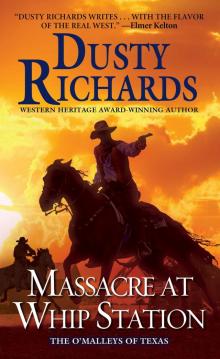 Massacre at Whip Station
Massacre at Whip Station Blue Roan Colt
Blue Roan Colt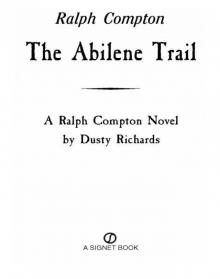 The Abilene Trail
The Abilene Trail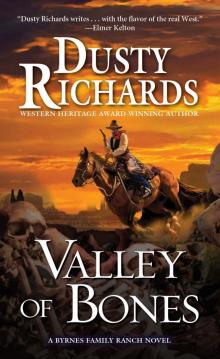 Valley of Bones
Valley of Bones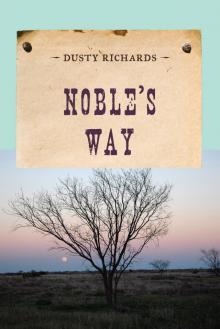 Noble's Way
Noble's Way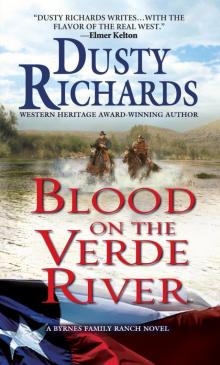 Blood on the Verde River
Blood on the Verde River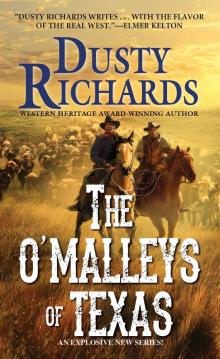 The O'Malleys of Texas
The O'Malleys of Texas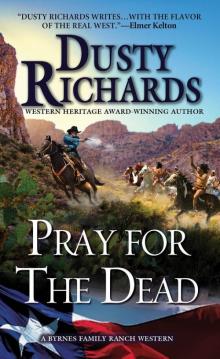 Pray for the Dead
Pray for the Dead Arizona Territory
Arizona Territory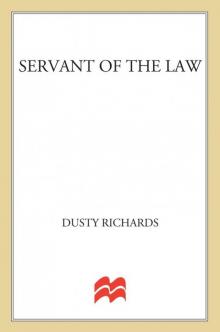 Servant of the Law
Servant of the Law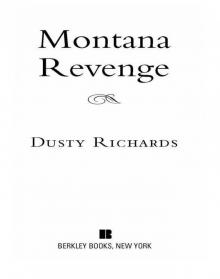 Montana Revenge
Montana Revenge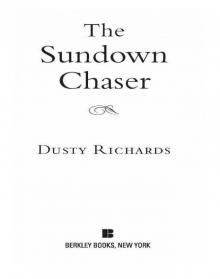 The Sundown Chaser
The Sundown Chaser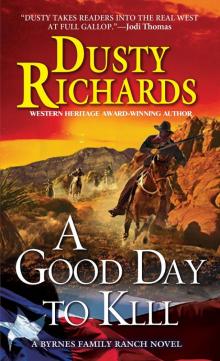 A Good Day To Kill
A Good Day To Kill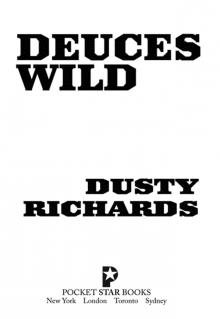 Deuces Wild
Deuces Wild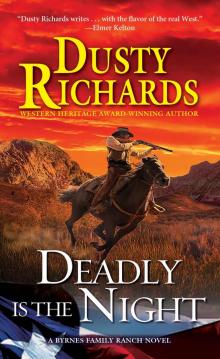 Deadly Is the Night
Deadly Is the Night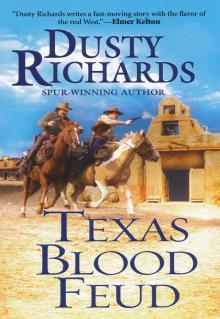 Texas Blood Feud
Texas Blood Feud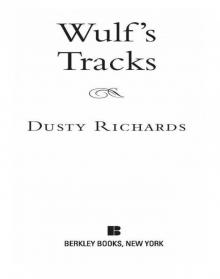 Wulf's Tracks
Wulf's Tracks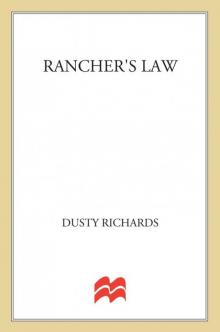 Rancher's Law
Rancher's Law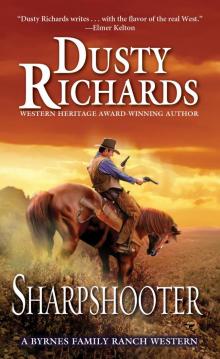 Sharpshooter
Sharpshooter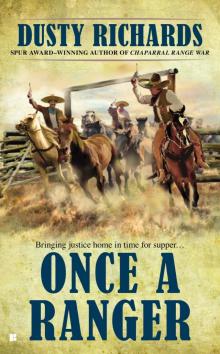 Once a Ranger
Once a Ranger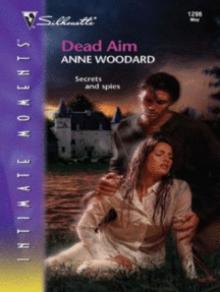 Dead Aim
Dead Aim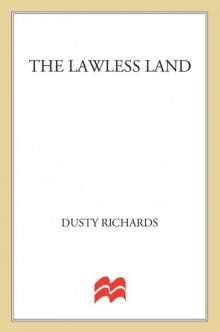 Lawless Land
Lawless Land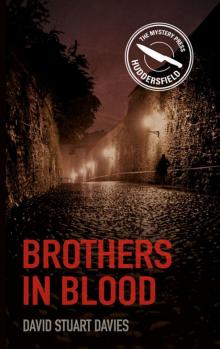 Brothers in Blood
Brothers in Blood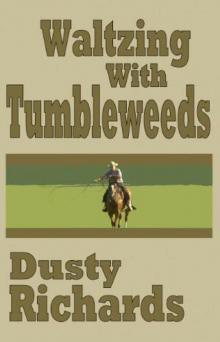 Waltzing With Tumbleweeds
Waltzing With Tumbleweeds